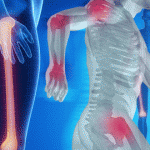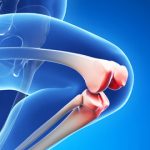A new guideline developed by the ACR and the American Association of Hip and Knee Surgeons addresses the perioperative use of antirheumatic drug therapy. Specifically, it provides recommendations on the use of traditional disease-modifying antirheumatic drugs, biologic agents, tofacitinib and glucocorticoids in adults with RA; SpA, including ankylosing spondylitis and psoriatic arthritis; JIA; or SLE undergoing elective THA or TKA. The guideline provides recommendations regarding when to continue, when to withhold and when to restart these medications, and the optimal perioperative dosing of glucocorticoids…

Improved Diagnosis of Greater Trochanteric Pain Syndrome
New research evaluated the diagnostic accuracy of 10 clinical tests of hip pathology typically used to diagnosis greater trochanteric pain syndrome (GTPS). However, pain provocation tests, such as the FABER test, proved most useful for ruling out the condition rather than diagnosing it…
Review Finds Increased Osteoarthritis Risk in Tactical Athletes
NEW YORK (Reuters Health)—Members of the military and firefighters are at increased risk of osteoarthritis (OA), a new systematic review shows. “Osteoarthritis is more common in people who are tactical athletes, people who are firefighters and military service members, than it is in the general population,” Dr. Kenneth Cameron of Keller Army Hospital in West…

New Insights into the Structure of Collagen Fibril
A study of knee and hip articular cartilage found that thick fibers were bundles of thin fibrils—like a multi-thread rope in which each thread corresponds to a prototypic sub-fibril. The organization of the fibers also differed between the cartilages of distinct tissues, which may explain how a breakdown in the fiber pattern contributes to pathology…
Verdict: Johnson & Johnson to Pay More Than $1 Billion for Defective Hip Implants
(Reuters)—A federal jury in Dallas on Thursday ordered Johnson & Johnson (J&J) and its DePuy Orthopaedics unit to pay more than $1 billion to six plaintiffs who said they were injured by Pinnacle hip implants. The jurors found that the metal-on-metal Pinnacle hip implants were defectively designed and that the companies failed to warn consumers…

Lateral Hip Pain: Could It Be Gluteal Tendinopathy?
Researchers recently found that physical tests that involve an active muscle contraction were most useful in identifying gluteal tendinopathy in patients with lateral hip pain. However, patients who were not palpably tender over the greater trochanter were unlikely to have GT detected during an MRI…
Conservative vs. Surgical: What Influences OA Treatment Choices?
Prior research has found that the use of surgery to treat osteoarthritis is increasing, while more conservative treatments, such as physical therapy, are underused. This disparity drove researchers to examine what influences a patient’s treatment choice. They found that a treatment’s characteristics—including a patient’s expectations for effectiveness and risk—affect decision making. Other influences: personal investment and circumstances, as well as support and advice from social networks and healthcare providers…

Patients with PsA, Cutaneous Psoriasis May Undergo Hip Replacement
A recent study of patients with psoriatic arthritis and cutaneous psoriasis found that these patients do not have a higher risk of worse outcomes after total hip arthroplasty compared with patients with osteoarthritis…
U.S. Judge Cuts $500 Million Verdict over Johnson & Johnson Hip Implants
NEW YORK (Reuters)—A U.S. judge has slashed a $500 million verdict against Johnson and Johnson and its DePuy unit over allegedly defective metal-on-metal Pinnacle hip implants to approximately $151 million. On Tuesday, U.S. District Judge Ed Kinkeade in the Northern District of Texas says he was compelled to reduce the verdict under a Texas state…
Patients with Mental Illness Fare Worse after Hip Surgery
(Reuters Health)—People with psychiatric illnesses are more likely to have complications after hip replacement surgery, according to a recent analysis. This added risk is something doctors and patients should discuss in advance, the study team writes in The Journal of Arthroplasty, March 17. Previous studies have linked depression and other mental illnesses to greater complications…